Peter MALONE
Saturday, 18 September 2021 19:23
Carousel
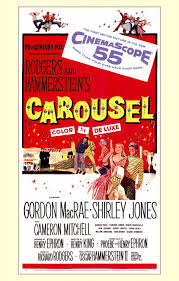
CAROUSEL
US, 1956, 125 minutes, Colour.
Gordon Mc Rae, Shirley Jones, Cameron Mitchell, Barbara Ruick.
Directed by Henry King.
Carousel is one of the earliest films of a Rodgers and Hammerstein musical. Their first musical was Oklahoma, filmed at the same time with the same stars, Gordon MacRae? and Shirley Jones. It was a bright musical. Carousel is in a minor key, a sad musical, but one with hope.
Gordon MacRae? portrays Billy Bigelow, who had been a no-good type around the town. He dies, but is allowed one day to come back to Earth to try to right any of the wrongs he had done. He finds that he was loved – and finds some redemption. Shirley Jones portrays Julie. The supporting cast is led by Cameron Mitchell.
Some of the songs have entered into the classic status including the theme song, ‘Carousel’, ‘If I Loved You’, ‘The Soliloquy’ and one that is used in many other films since, ‘When You Walk Through a Storm’.
The film is directed by veteran Henry King who had been an actor in films since 1913 and a director since 1915. He emerged during the 1930s with some classics including Lloyds of London, In Old Chicago and Jesse James. At 20th Century-Fox? for almost twenty years, he directed a number of their most successful films ranging from The Song of Bernadette to Prince of Foxes. He also in the 50s directed The Snows of Kilimanjaro, O. Henry’s Full House.
Carousel is based on the Hungarian play, Liliom, written by Ferenc Molnar. There were various film versions of Liliom including a version in 1919 by Michael Curtiz, a 1930s version with Charles Farrell, directed by Frank Borzage, and a French version directed by Fritz Lang with Charles Boyer.
A television version of Carousel was produced for television in 1967 starring Robert Goulet.
1. Was this a successful musical? Why? How well did it use the conventions of the musical: story line, fantasy, the songs, dancing, characterisations, comedy? Does the film now seem dated in its style?
2. The film had the advantage of a story on earth and fantasy from Heaven. Did it use this advantage well? Did this add to the charm of the film?
3. What was the point or the moral of the story? the moral made in Heaven about earth? About life and our influence on one another? About redeeming our mistakes?
4. Was Billy an attractive hero? What kind of a man was he?
The reality of his charm? How shallow? How loving? How intelligent? Did he love Julie at all?
5. Julie? why was she so infatuated with Billy? Did she really love him? The meaning of her devotion to him? How intelligent a girl was she? Did she deserve to be deprived of Billy? Or would she have had a happier life without him?
6. The impact of the Carousel theme and the love theme for Julie and Billy?
7. How did the film gain atmosphere especially from the "June is busting out all over" songs and dances? From the Clambake sequence? From "When the children are upstairs"? From the island and the picnic?
8. The significance of Billy's song about his son or daughter what did this reveal about him? Was it an important part of the film?
9. The character of Jigger: how attractive or unattractive? Why did Billy like him? How could he persuade Billy to participate in a robbery?
10. What was Billy after in joining in the robbery? The amateur nature of the robbery? The accident of Billy's death? What impact did this have in the film?
11. How did the film change in tone and style after Billy's death?
12. Did you enjoy the sequences of Billy's daughter? her being taunted, the ballet sequence with the carnival people?
13. What effect did Billy's return have on his daughter and on Julie? Why?
14. The graduation ceremony? what impact did this have? How optimistic? Too optimistic? The singing of the song?
15. What was the final and overall impression of the film? Optimistic? Happy?
Published in Movie Reviews
Published in
Movie Reviews
Tagged under
Saturday, 18 September 2021 19:23
Carlton-Browne of the F.O.
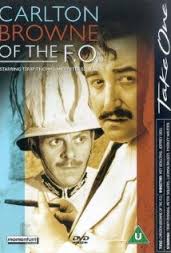
CARLTON-BROWNE OF THE F.O.
UK, 1958, 88 minutes, Black and white.
Terry Thomas, Peter Sellers, Ian Bannen, Thorley Walters, Raymond Huntley, Luciana Paluzzi, Miles Malleson, Irene Handl, John Le Mesurier.
Directed by Jeffrey Dell, Roy Boulting.
Carlton-Browne? of the FO is an amusing British comedy in the spirit of the late 1950s. It was a star vehicle for Terry-Thomas? who does his usual feckless thing. Peter Sellers appears in a cameo role, more subdued and sinister than usual. There is an excellent British supporting cast led by Ian Bannen as well as a number of character actors.
The film is an intelligent spoof on Britain and its ambitions and claims, memories of past empire. In this film, a small island which had been discovered in the 18th century by accident, is having its own problems and Carlton-Browne? is sent by the Foreign Office for diplomatic reasons. He is definitely the wrong choice.
The film was co-directed by Jeffrey Dell, prolific writer in the 40s and 50s, and one of the Boulting twins, Roy Boulting, whose films include Fame is the Spur, Seven Days to Noon, Heavens Above.
1. A good English comedy? Why? What were its main features?
2. The film had a lot of edge in its comedy. What was the nature of this edge? To whom was it directed?
3. What was the picture of England, colonial office, foreign office and English traditions given by the film? Was it a realistic picture of England? Was it too exaggerated a picture of England and its diplomacy? How much truth was there in this picture?
4. At times the film seems cynical about Britain, America, Russia, the United Nations. Was it cynical? Examples, British behaviour at the United Nations meetings, the visit of representatives to Gaillardia. The sending of troops, Gaillardia, military parade, etc.
5. Comment on the behaviour of Carlton Browne, as a person, as an Englishman, as a diplomat, as foolish; comment on the behaviour of the Prime Minister, as a person, as incompetent, as double-dealing, as ignoring the wishes of the people; comment on the behaviour of the minister and his diplomacy.
6. Comment on the role of the young king in the film. He spoke words sincerely about good ruling, and about the people. How did these sincere words counterbalance the comedy and the cynical remarks of the diplomats?
7. How funny was the film? were there genuinely funny moments?
8. Comment on the minor characters and the satire the king, his uncle and his revolution, the princess, romance, the colonel and his assisting Carlton-Browne? and his militant, attitudes.
9. There was a lot of incidental humour and comment? the newsreel interview with the average British housewife, the woman in the theatre, the people at the hotel, the military parade, etc. How mocking was this? How humorous?
10. What was the final impact of this film? why?
Published in Movie Reviews
Published in
Movie Reviews
Tagged under
Saturday, 18 September 2021 19:23
Cynara
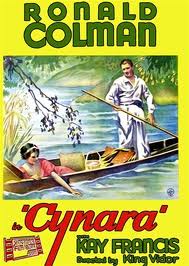
CYNARA
US, 1932, 75 minutes, Black and white.
Ronald Colman, Kay Francis.
Directed by King Vidor.
Now principally of interest as a film by noted director, King Vidor, who worked in the silent film industry, such as The Crowd through the thirties with Stella Dallas and into the forties with Northwest Passage and Duel in the Sun. It also has a very typical Ronald Colman performance. It is interesting in its presentation of the theme of marriage and fidelity, but the overall presentation and style is now very dated. Of historical interest.
1. An interesting film from the 30s? The work of the director King Vidor. Ronald Colman? Impact then, now?
2. The focus of the title, the introduction and praise of Ernest Dowson's lines? Themes of fidelity? The title of the original play, the themes indicated?
3. The British setting and its sobriety, British society, the background of law and legal practice, the contrast of classes and working girls? A comedy and melodrama of manners? The black and white photography, the score? Was it evident that the film was based on a play? The adaptation of the play to the screen?
4. The flashback framework and audience emotional response to the themes? Warlock's confession of infidelity and his wife's attitude? The return to this at the end in the light of his confession? Audience judgment on him, sympathy? His acknowledgement of guilt? The importance of his friend's arrival and commenting to Clemency? Clemency's judgment on her husband's confession, the audience's judgment? The justice of his going away? His asking for forgiveness, her eventual giving of it? Did the audience share her attitude?
5. Ronald Colman's style and performance an Jim Warlock? His legal work, his love for his wife and the way this was illustrated, her going away? His meeting with Tring as a man about town, the discussion with the girls and their talking about him, his expectations of behaviour, his wife's expectations? How high wore his standards? The beginnings of the infatuation with Doris, accompanying her home, the motivation for yielding? The judging of the beauty competition? The beginning of the affair, the holiday together, the necessity of leaving, his explanation of this to her, the letter?
6. The portrait of Doris and her friend, their chatter, their talk about Warlock? Her presence at the competition, her conditions about the affair and her confession about a previous affair? Her joy, disappointment? Knowledge of Jim's wife? Loss of her job, her suicide? The repercussions of the suicide? whose responsibility? Doris's friend accusing Warlock? The attitude of the Court, his concealing the truth about her reputation? His confession to his wife? Feelings of guilt and responsibility?
7. The portrait of Clemency as an ordinary wife, the tensions in the sequences on her return home, the opportunities for confession. the discussions about fidelity and their point? Her forgiveness?
8. Tring and his arrival at the end, blame, appeal for forgiveness?
9. The tone was comedy of manners but how much insight into marriage?
Published in Movie Reviews
Published in
Movie Reviews
Tagged under
Saturday, 18 September 2021 19:23
Curtain Up
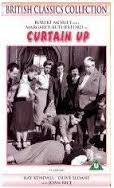
CURTAIN UP
UK, 1953, 81 minutes, Black and white.
Robert Morley, Margaret Rutherford, Kay Kendall, Michael Medwin, Joan Hickson.
Directed by Ralph Smart.
Curtain Up is one of those short British comedies full of very good acting, for example Robert Morley and Margaret Rutherford, very humorous lines and a parody of the British style. The setting Is a country repertory theatre in rehearsal. There are many expected situations but all In all this Is a very pleasing British satire.
1. A typical small-budget English comedy, British style, of the early fifties? Its appeal, impact, comedy success?
2. Conventions of the English comedy of the time, black and white photography, simple location, emphasis on eccentric British characters interacting with one another? The enjoyment of this kind of observation of a section of England, English society. English foibles? How perceptive, how humorous?
3. Black and white photography, the skit on English repertory theatre and the presentation of the theatre itself ? stage, auditorium, costumes, special effects etc.?
4. The credibility of the plot? Arranged to make a point about dictatorial directors, eccentric authors, would-be actors and actresses, humorous plays and the traditions of the British theatre?
5. How well drawn were the characters? Developed as characters or representing British types? Robert Morley's style as Harry the director - Morley's mannerisms, style, wit? How well did he use it to convey the dictator-director and his encounter with Margaret Rutherford, as the author? Margaret Rutherford's style and the daffy and eccentric lady playwright, interfering, taking over? Maude and the older members of the cast with their experience and resignation to the way things are? Sandra and her husband with their hopes for moving into films and away from repertory and the country? Avis as the young girl with her dreams of success in the theatre having to be dissuaded?
6. How well conveyed was the atmosphere of the theatre, the rehearsals, the lunch breaks, the gossiping, the fighting? Phone calls, the hospitalization of Harry?
7. The quality of the comedy - the humorous lines, the farcical incidents, the perception of the particular types drawn and their strengths and weakness and the humorous side of human nature?
8. Comment on the memorable comedy sequences ? especially with Morley and Rutherford?
9. The conventions of British optimism and 'the show must go on' underlying the basic message of this film and its presentation, endearingly of things British?
Published in Movie Reviews
Published in
Movie Reviews
Tagged under
Saturday, 18 September 2021 19:23
Capturing the Friedmans
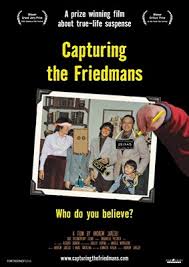
CAPTURING THE FRIEDMANS
US, 2003, 107 minutes, Colour.
Directed by Andrew Jarecki.
This challenging documentary lost out in the Academy Awards to Errol Morris' interviews with Robert S McNamara? about US foreign policy, The Fog of War. However, it did win the Grand Jury Prize at the Sundance Festival and many other awards. It is a very careful documentary about a difficult subject.
The Friedmans seemed to be a typical American family, especially with their love of capturing all their memories on film and then on video. The film builds up a portrait of Arnold the musician and teacher father, Elaine his strong-minded wife and their three sons. Suddenly, their word was overturned as Arnold and his youngest son, Jesse, were arrested for child molestation, charged with both of them eventually going to jail.
Andrew Jarusick became interested in their story, doing investigative research about the case. The eldest son, David, told him about the hours of footage he had. A documentary using this footage, using television news material from the time of the trial and contemporary interviews emerged. The material has been edited together so that the audience sees the chronology of Arnold's life, marriage and family, hears the testimony of the principal people involved (especially Elaine, David and Jesse as well as detectives, the judge, lawyers, victims and their parents), sees the footage of how the family behaved at the time of the trial (bizarre, frantic and hostile). The director also makes it hard to know what the actual truth is. One piece of the film, one interview, points in a particular direction of guilt, then another piece throws doubt on what has been said. The evidence for the accusation was testimony rather than physical evidence and this raises difficulties concerning police leading witnesses, false memories, lies and self-defensiveness.
This means that the audience has a great deal to absorb, is continually challenged to try to understand the characters, while being horrified at the charges and the implications about paedophilia. It is both gruelling and challenging.
1. The impact of the film, its awards and nominations? A piece of Americana? Fact/fiction?
2. The technical qualities of the film: the interviews and the direct speaking to camera, the frank interviews and expressions of experience and memory? The use of the Friedmans' home videos? The range, of Arnold Friedman's sister in the 30s, of his band playing in the 40s and 50s, of the family through all its stages? David Friedman and his beginning to use hand-held home video camera in 1988? His personal diary? The use of the video camera throughout the trial, photographing the family at home, especially their squabbles, fights and screaming? In the jury room and the shouting? The insertion of televised material from the arrest, the news coverage, the trial? Larry King Live? The filming for the epilogue, each of the characters around 2001? Jesse and his returning home to his mother?
3. The editing of the film: the choice of home videos, of interviews? The intercutting? The introduction to Arnold Friedman, the focus on his career, his life, as a father? The building up of the portrait of the family and the love? The irony by suggesting early in the film that there was the dark side, the criminal side? The selection of interviews so that the narrative was built up, especially for the events of 1987 leading to Arnold Friedman's arrest, trial and imprisonment? The musical score? The songs? Arnold playing his music and singing during the final credits?
4. The focus on each of the characters:
- Arnold Friedman, the father of the family, the explanation of his background, his father and mother, he and his brother living in the same room, the information about sexual relationships, their mother's promiscuity? His brother's homosexuality? His own sexual relationships with his brother, with young boys during his adolescence, his falling in love with them? His work in the band, his success? His marriage to Elaine, the footage of their courtship, proposal and dancing? His being the father of the family, the distance from his wife, his love for his children, especially Jesse? His career and success as a teacher, computers, music? His having classes in his home? The gradual revelations about him, the pornographic materials, the postman, the arrest and the search warrant? The interruption of family life, his son being arrested? The information about the classes, the accusations by the children, their being a lack of physical evidence, the reliance on testimony? His going to trial, the reaction of the media, the public? The discussions about his guilt or innocence? His being home on bail, the home videos of the family life, the Seder Supper, shouting at each other, his remaining calm, protesting his innocence, his relationship with his wife? His playing the piano before going to court? The trial, the discussions about his pleading guilty or not, his pleading guilty and blame coming to Jesse? Elaine's reaction? His sons wanting him to tell them the truth? The importance of the correspondence with the investigative journalist, her comments on the case, her letter from him, his explaining the details of his sexual activity in the past? His being in prison, attacked? The severity of the judge, the final sentence? His overdose for depression, his death, seeing his tombstone?
- Jesse Friedman, Arnold's youngest son, appearing in all the home movies, working with his father with the classes, the accusations of brutality and sexual abuse, his protesting his innocence? His being interviewed at the time of the trial, his age, experience? Whether his father should plead guilty or not and the repercussions for him? His discussions with his own lawyer, the lawyer believing that his father had abused him, the weeping in the court - while fooling around for the video on the courthouse steps before his sentence? His relationship with his brothers, with his mother? Going to jail, the severity of the sentence? His getting out and the audience seeing him embrace his mother at the end?
- David Friedman, the eldest son, his place in the family, the explanations that he was caring for his younger brothers? His relationship with his father, the boys as a gang, loving and supporting their father? Their alienation from their mother, criticisms of her, her coldness? David's analysis of the marriage? His own video, the desperate diary video and his anger at the police, not knowing who would see the video? His behaviour during the trial, believing his father innocent, at the family table, trying to be protective? His later life, seeing him as a clown, his success in New York City?
- Seth Friedman and his being seen only in the footage, the explanation of his place in the family, his refusal to be interviewed for the film?
- Elaine Friedman, the mother? Her own family background and severity, her marrying Arnold, her ignorance, her expression of her hang-ups? The large amount of interview information from her, her balance as she gave the interview, the relationship with Arnold, with her children? Her being seen in the footage, strident and aggressive? Her reaction to the arrest, at home, supporting Arnold and getting him the bail, yet their not being close? Her not being aware of his sexuality, her shock at the pornographic magazines? Her anger with her sons and their rejection of her? The plea for the guilty charge? (verdict?) The comment of David about her domination and her own comment about Arnold needing to confess and go to jail? The aftermath, her remarriage, her hoping for peace and healing, waiting for Jesse to come home?
- Howard Friedman, Arnold's brother: the story of their childhood, in the one room, sexual relationships, it only being revealed later in the film that he was in partnership with a friend, seeing them together? His testimony, his disbelief about his brother, not believing the guilty charge or the verdict? The pain in remembering his family, his saying that he blocked out any of the early experiences?
- Debbi Nathan as the investigative journalist, seeing her on Larry King? The discussions about the McMartin? trial, her knowledge of such cases? Her balanced view, her perceptions on the family, guilt and responsibility? The letter that Arnold sent her outlining his sexual history?
- Judd Moulton, Jesse's friend, his testimony about Jesse at school, not believing the accusations?
- Judge Abbey Boklan, presiding over the trial, her later interviews, her knowledge of such cases, her severity in sentencing both father and son? Scott Banks: the judge's legal secretary, his reminiscences, being seen in the court footage, observations on the case?
- Detective Sergeant Frances Galasso: the chief detective, her being seen in action, the focus in the film on her reminiscences about what happened, her care about the accusations, the investigation, sending out the detectives for the interview? Her belief in Arnold's guilt?
- Jerry Bernstein: Arnold's lawyer, his defence, his observations, his memories?
- Peter Panaro: Jesse's lawyer, the memories, his ethics, wanting to have a not guilty plea if Jesse was innocent, the guilty plea, being persuaded that Jesse was abused by his father, Jesse denying it?
- Ron Georgalis: the computer student, his memories of the classes, his finding them boring, not believing that Arnold was guilty?
- The other students shown in silhouette: the reclining student who believed that Arnold was guilty, his memories of the crimes?
- The various parents interviewed in silhouette?
The assistant district attorney, the other detectives, the postal inspector and their memories of the time, their perceptions, their trying to be balanced?
5. The issues of truth: the nature of memory, people and their memories according to their needs, blocking out of memories? The audience and the seeing of the interviews, the home movies, the director's juxtaposition of the testimony - believing what they saw and heard? About Arnold's guilt and responsibility? About the police work and their objectivity or bias? Jesse's testimony about himself?
Published in Movie Reviews
Published in
Movie Reviews
Tagged under
Saturday, 18 September 2021 19:23
Clerks
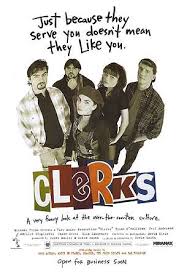
CLERKS
US, 1994, 97 minutes, Black and white.
Brian O'Halloran, Jeff Anderson, Marilyn Ghigliotti, Lisa Spoonauer, Jason Mewes, Kevin Smith.
Directed by Kevin Smith.
Clerks is the first film by writer-director Kevin Smith, made when he was twenty-three on a budget of $27,000. He made it in a video store in New Jersey where he was employed and filming was done over three weeks at night. (There is a joke about the shutters of the shop being jammed - which covers the fact that the film was made at night.)
Smith sets a tone for his films, a great deal of talk (somewhat in the Quentin Tarantino vein), humorous observations about serious matters as well as all kind of trivia, especially pop culture, especially comics and films like the Star Wars series. Smith is able to get a lot of observation about culture from his twentysomething perspective and comments on the tones of the 90s that his peers would be able to understand and appreciate. The irony is that in his films he portrays Silent Bob, scarcely saying anything in any of the films, leaving the inane chatter and the gross comments to his companion Jay, played in all the films by Jason Mewes.
The film focuses on two young men who work at video stores, all the things that go wrong in their day, tragic and comic. The film also has a great number of characters and the film's credits give names to a great number of these, indicating the tone of the film: Indecisive video customer, Dental school video customer, Hockey goalie engagement savvy customer, Happy scrappy kid, Bedwetting dad/cold coffee lover, Video confessor/candy confession customer.
The film is what many of the commentators called Slacker movie, a focus on young men who seem to be indolent, laissez faire, happy and unhappy-go-lucky who survive each day, things upsetting them, things making them happy, but drifting on from day to day. This tone continued in Smith's subsequent film Mallrats but things became more serious with Chasing Amy and Dogma. After his own marriage, he made a more conventional look at people's relationships, Jersey Girl.
1. The work of Kevin Smith, visual, verbal? The Slacker ethos? The humour, the commentary on ordinary day-by-day life for twentysomethings? In New Jersey? In the United States? How universal the issues, types?
2. Black and white photography, the use of the video shop, the blinds drawn, the enclosed world of the shop, a microcosm of New Jersey? The musical score and the range of songs?
3. The title, the focus on Dante and Randall, their work, their lives, their outlook? Their work in the two shops? Their relationship to the boss? The range of customers who came, their treatment of the customers, friendly and unfriendly, the nicknames for the customers indicating the range of people, their mundane interests, their serious interests?
4. The character of Dante, the focus on him? The convenience store, his day off, his being asked to come in, the extra shift? His having to get up, his hockey practice, his coming in? His girlfriend, Veronica? Her discussion about her sexual activity? His reaction, discussion with his friend Randall, the video store? The information about Caitlin getting married, Dante's high school girlfriend? Veronica and her coming into the shop at different times? Dante and the information about the boss, his having to miss the hockey game? The negotiations for it to take place on the roof of the store, the ball going down the drain, abandoning the game? The old man, the pornography magazine, going into the bathroom - and the gross irony of Caitlin's sexual behaviour with him, thinking it was Dante? The information about their school friend's death, going to the wake, not staying very long - after Randall knocks the casket over? The fitness trainer, his dating Caitlin, the inspector, the selling of cigarettes to minors? Dante and the cumulative effect of all these events of the day? Caitlin coming in, her breaking off her engagement, wanting to go out with him? Her return from the bathroom and the gross information? Caitlin in shock, in hospital, Dante's reaction? Criticism that he isn't caring about Veronica? Randall coming back to the store, his fighting with Dante, the resolution of the clash? Closing the store? The events of the day? What was revealed about Dante's character, his behaviour, his attitudes?
5. The character of Randall, working next door, how similar to Dante, how different? Their discussions? Dante relying on Randall as his best friend, the news about Caitlin getting married, Randall and his arguing with Veronica? The going to the wake, his awkwardness with the casket? His discussion with Caitlin, his arguing with Dante about his attitude towards Veronica? His telling Veronica about Caitlin? His coming back to the store, the clash with Dante, patching things up?
6. The two girls, their relationship with Dante, Caitlin in high school, Veronica later? His attitudes towards them? Love, sex? Caitlin and the engagement? Coming to the store, thinking that she had a relationship with Dante but was with the old man? Her going into shock, in hospital, Randall and his discussions? Her future with Dante? Veronica, dating, her boasting about her sex activities? Randall telling Veronica about Caitlin? The attitude of Kevin Smith towards the women?
7. Jay and Silent Bob, their presence, Bob and his visual expressiveness, especially his face? Jay and his continued talk, gross, inconsequential, ignorant and crass attitudes? The comic effect of each of them?
8. The range of customers, their interests, concerns, the nicknames given to them in the cast? A cross-section of New Jersey people who use a convenience store? Smith using the convenience store as a kind of microcosm? A picture of America? World picture - American style?
Published in Movie Reviews
Published in
Movie Reviews
Tagged under
Saturday, 18 September 2021 19:23
Curse of King Tut's Tomb, The

THE CURSE OF KING TUT’S TOMB
US, 1980, 98 minutes, Colour.
Eva Marie Saint, Robin Ellis, Raymond Burr, Harry Andrews, Angharad Rees, Wendy Hiller, Tom Baker, Patricia Routledge, Faith Brook.
Directed by Philip Leacock.
Quite a lavish telemovie. Filmed beautifully in Egyptian locations with twenties' English settings as well, the film shows the discovery of King Tutankhamen’s Tomb by Howard Carter. This archaeological background is interesting in itself. However, influenced possibly by the curse of the mummy stories, various curse stories were associated with the Carter expedition. The film plays on these.
The result is a blend of sensational story with documentary. Directed by Philip Leacock, the English director of such classics as The Kidnappers and who moved to the United States and worked long in television, the film has an excellent English cast. There in a narration by Paul Scofield. Eva Marie Saint represents American interests. On reflection, there in not particularly much to the film. However. while it is screening it is interesting and attractive.
1. The appeal of the film: history, archaeology, the exotic past and its rediscovery, the curse and the melodrama associated with the opening of Egyptian tombs?
2. The impact for the television audience - enjoying the melodrama at home, commercial breaks? Information, documentary, drama?
3. The English cast and its contribution? Light budget, location photography and its beauty, the visual impact of Egypt? Special effects?
4. The reputation of Howard Carter, the archaeologists in Egypt, 19th century and early 20th century? The reputation of King Tutankhamen’s tomb. its fame. exhibits over the world during the following decades? Audience interest in the theme?
5. Audience knowledge of ancient Egypt from history, the Bible, archaeology? Exotic? The important relics still remaining? Audience curiosity?
6. The filming of Egyptian locations, their beauty, the desert, buildings, ruins? The digging sites? The government interest in supporting archaeology? The British aristocracy and financial backing? The Egyptian hotels of the twenties? The methods for the diggings? The personnel involved? The studious background, personal greed?
7. The curse and the imaginative presentation of it? Curses and their effect on the imagination? The fostering of superstition? The play of coincidence? The hieroglyphs and their warning, the number of deaths and the violence of the deaths, the animals, the bites and the snakes, suffocations? The importance of the opening seance and its effect? The presence of the Princess and her comments? Audience responding to curses imaginatively!
8. The importance of the narrative - and spoken by Paul Schofield? Its information, its ironies? The ironies of the final comments about the fate of the people involved?
9. The portrait of Howard Carter? as a character, sober and single minded, the growing obsession about his archaeological work? The support of Lord Carnarvon? His visit to Carnarvon to get the backing and the money for King Tut's tomb? Evelyn and her love for him, his response? The choice of archaeological work? Miss Morrissey and
Her presence, socialising with her, the discussions, her sharing his experience? The various assistants and their work - and several of them being killed? The encounter with Sebastian and his greed? His becoming Sebastian's victim? Hassan and his betrayal? The friendship with Fishbait, his help, the pathos of his death? The build-up to the discovery, the details of cataloguing, the role of the Egyptian government? Lord Carnarvon and his jealousy? Carter's grief at the deaths? his decisions about his find, his work? His reputation and his continued career?
10. Lord Carnarvon as sponsor of the archaeological expeditions? The blustering British type, his continued support, his pride? His love for his daughter? The cold relationship with his wife? The princess and her sayings? His wanting publicity? His being bitten, the curse, the effect of the violence of his death?
11. The contrast with Sebastian and his greed, his assistance? The woman and her stealing the document, her trying to blackmail Sebastian and his quickly killing her? his deals with the government and giving false information? Hassan and the plane crash? his being outwitted in tactics by Carter?
12. Miss Morrissey - the American journalist, curiosity, her presence at the important discoveries, the personal relationship with Carter?
13. The purpose of having the Princess as character - the seance. her warnings, her final utterances? The narrator's final ironic comment on her and her loss of money?
14. Fishbait - his place in Egypt, orphan, shrewdness, friendship with Carter, helping with the work, the pathos of his death?
15. Hassan and his insinuating himself into the entourage, his double dealing, the plane crash?
16. Howard Carter's achievement in exploration, understanding the desert, the technology of excavations. his discoveries and their significance?
17. How successful the film as semi-documentary, imaginative narrative recreation of the events? Audience interest, entertainment, information? The atmosphere of the Curse for popular entertainment - and the significance of the information of the epilogue?
Published in Movie Reviews
Published in
Movie Reviews
Tagged under
Saturday, 18 September 2021 19:23
Cry Panic
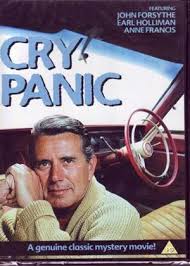
CRY PANIC
US, 1974, 74 minutes, Colour.
John Forsythe, Ralph Meeker, Earl Holliman, Anne Francis, Claudia Mc Neil.
Directed by James Goldstone.
A good, brief suspenseful telemovie. It involves a conspiracy and a murder. The audience, identifying with the hero played by John Forsythe, becomes involved in the mystery and the urgency of solving the mystery. There is a good supporting cast in brief roles. The pacing and suspense is well held. Direction is by James Goldstone who has made a number of telemovies, for example Eric and many cinema feature films including Winning and Roller Coaster.
1. The appeal of the murder mystery, the thriller? Audience involvement, puzzle, solution? The tone of the title?
2. The techniques of the thriller for a telemovie brevity, pace, commercial interruptions, home viewing? How well did this film involve audiences and keep suspense?
3. The ordinariness of the opening, the accident, Ryder and his decisions, phoning the police, doing the right thing and its repercussions?
4. The mysterious presence of Julie and her enigmatic remarks, help? Her later appearance in the restaurant? Ethel’s story and the deception about Julie? her sudden reappearance and seeming to help him, betraying him, her death? The irony of Ethel’s attitude towards her employer and Julie? her finally helping, her telling the truth at the end?
5. The sheriff and his response to Ryder, to the investigation, his being revealed as in league with the men of the town, the involvement in the conspiracy, the decisions, the administration of his job? The confrontation with Ethel? The irony of his shooting Julie? The confrontation with Ryder and his death? A credible portrait of an ambitious sheriff and a jealous husband?
6. Braswell and his hostility, the garage, trying to detain Ryder, confrontation and pulling the gun on him? his place in the conspiracy?
7. Ryder's being at the motel and the puzzles, the telephone calls, the discovery of the identity of his victim by the paper? his being compelled to investigate? Julie’s overhearing the meeting, the corpse in the freezer? The audience sharing his puzzle?
8. The basic financial and business situation concerning the dead man, the need to cover up, the various contingencies and the doctor's plans?
9. Ryder and his interrupting the meeting? his being arrested, the authentic police and their difficulty in believing him? His feeling of being trapped? Ethel's absence from the house? The relief and her telling the truth at the bus stop?
10. Themes of responsibility, crime, the administration of justice, right and wrong, personal integrity and involvement despite dangers? A credible story for the ordinary home audience?
Published in Movie Reviews
Published in
Movie Reviews
Tagged under
Saturday, 18 September 2021 19:23
Cry of the City

CRY OF THE CITY
US, 1948, 95 minutes, Black and white.
Victor Mature, Richard Conte, Fred Clark, Shelley Winters, Berry Kroger, Debra Paget, Hope Emerson.
Directed by Robert Siodmak.
Cry of the City was considered a good film noir, tackling contemporary problems in American cities, especially clashes between Italian Americans and the law.
Victor Mature and Richard Conte portray two friends from childhood who grow up, one a policeman (Mature) and the other a criminal (Conte). There is a crooked lawyer and Conte’s character is forced to go out and kill again to protect a young girl, an early role for Debra Paget. The film builds up to an inevitable confrontation between the two men. In the supporting cast is Shelley Winters in an early role as well.
Robert Siodmak had made a number of films in his native Germany and then in France after his leaving Germany with the coming of Hitler. He made quite a number of films in Hollywood, especially in the mid-40s with a number of excellent film noir including The Spiral Staircase, The Killers, The Dark Mirror, Criss Cross, The File on Thelma Jordan. After making The Crimson Pirate in 1952 he went to make films in Germany, returning only rarely to the United States. One of the films he made on a return was a Cinerama, Custer of the West.
A very good film illustrating the style of the times as well as the social issues of the late 40s.
1. How interesting, entertaining? Social criticism? The style of the black and white documentary thrillers of 20th Century Fox? The overall impact?
2. The documentary realism tone and the presentation, black and white photography, musical score, city locations and atmosphere? The black and white of the American city?
3. The portrait of an American city in the forties? The post-war period? The American gangster tradition? The world of the criminals, their crimes, homes? Their hold over one another? The effect of crime on families and friends? Violence, death?
4. The chase and confrontation structure of the film? The focus on Candella and his representing the law? On Rome as the criminal? The cat and mouse strategies? The importance of Tony and his admiration for both men? Tony as a moral focal point for the moral issues?
5. The character of Candella: Victor Mature's style, his explanation of his past, his place in the city and ambitions, his police work and his decision to remain with the police, his astuteness, his running the risk of danger? His powers of persuasion for Martin and for Tony? An a humane policeman? His encounters with the Rome family especially the mother? His being wounded, his achievement in bringing down Rome? A portrait of the admirable policeman of the forties?
6. The contrast with Martin Rome? The criminal type of the city, his arrest, his skill in his escape, his tense character, his hold over his brother, mother, family, the many girls in his life? His mother's reaction? Tony and his hero worship and his ultimate disillusioning his brother?
7. The portrait of the women and the way they were persuaded by Martin?
8. The Italian background and the portrait of the family and the mother and her way of life?
9. The character sketch of Tony, as a potential Candella or potential Martin?
10. The visualizing of crime, themes of responsibility. Consequences, example and hero worship? How satisfying was the resolution of the plot?
Published in Movie Reviews
Published in
Movie Reviews
Tagged under
Saturday, 18 September 2021 19:23
Cry of the Banshee, The
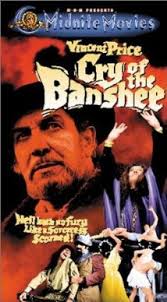
THE CRY OF THE BANSHEE
US, 1970, 91 minutes, Colour.
Vincent Price, Hilary Dwyer, Carl Rigg, Patrick Mower, Essie Persson, Elizabeth Bergner, Sally Geeson, Hugh Griffith, Robert Hutton.
Directed by Gordon Hessler.
Cry of the Banshee is a rather repellent horror film. It features regular Vincent Price, this time as an English lord who had a murderous character. His wife is played by Hilary Dwyer. Veteran actress Elizabeth Bergner has a supporting role.
The film was directed by Gordon Hessler who directed a great number of television series and television movies. However, between 1969 and 1971 he directed several horror films including a number with Vincent Price: The Oblong Box, De Sade, Scream and Scream Again and Murders in the Rue Morgue. This is not one of the best Vincent Price horror films. It resembles in some ways Witchfinder General, but that was a far superior film about the killing of a coven of witches.
1. The impact of horror films, audience expectations of violence, the atmosphere of the supernatural? Audience interest in films about witchcraft? historical presentation of witchcraft and religion? How appropriate was this film in fulfilling expectations?
2. The significance of the title? The initial reference to Edgar Alan Poe and the explanation of the title, the indication of themes, of witchcraft, religion and superstition? Violence?
3. How well done was the historical recreation of 16th century England? Forests, castles, banquets, witchcraft? The use of colour? The presentation of violence within this world? The film's use of gore, did it exploit its subject?
4. Audience response to Oona and her associates, the initial presentation of the old religion and the styles and rituals of superstition? The vengeance against Christianity and its persecution of the old religion? The attraction of people to the old religion and its superstitions? The characters in Lord Whitman's household who belonged to it?
5. Roderick as the incarnation of vengeance? His charm, his work in the household, becoming the lover of Maureen? An ambiguous instrument of love and death? His being an instrument of Oona, his lacking free will? The violence of his murdering? The violence of his own death and yet his being one of the undead? The sinister presence as driving the coach away at the end? The theme of the ever presence of evil?
6. Lord Whitman as a Vincent Price character? His ruthlessness, arrogance? His standing for Christian values and yet his double standards? His home, his sadistic attitude towards people, his persecution of the old religion and his relishing it, his dominance of his children, his dominance of his wife? His background and other wives? The lasciviousness of his banquet and murder being done at such a banquet? His relish in hunting people down? As an embodiment of establishment evil? A criticism of this kind of Christianity?
7. How well drawn were Lady Patricia, Lord Whitman's children? In this kind of society, in the Lord Whitman's household, moulds, religion? The delineation of Lord Whitman’s advisers, the fact that they were caught up in the frenzy fanaticism of persecution?
8. The contrast with the portrayal of people in the village, at the inns, entanglement with witchcraft, the reality of superstition in the ordinary people, their fear?
9. The visual presentation of Oona’s death? Audience response to her in the incantations and rituals and her using the doll with pins for her vengeance? her own death and its violence? Her attendants and their death?
10. The atmosphere of revenge and the immersion of the audience in questions of revenge?
11. The horror treatment of the film, horror and history? This kind of popular look at history, superstition and religion? Does it tall us something about the past? It relevance for the present?
Published in Movie Reviews
Published in
Movie Reviews
Tagged under